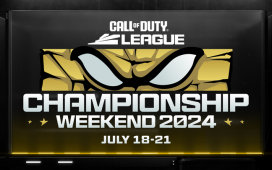Mentioned in this article
League/Tournament Brands:
German organization SK Gaming spent five years in professional League of Legends from 2010 to 2015, including the first three seasons of the European League of Legends Championship Series (EU LCS). After being relegated from the league in late 2015, the organization opted to pull out of the scene entirely.
However, last year’s announcement of the franchised League of Legends European Championship (LEC) pulled SK Gaming back into the fold. With a losing record in the Summer Split and failing to reach the playoffs, it hasn’t been an immediately successful competitive return for the team after three years away. However, founder and managing director Alexander Müller sees the LEC as a long-term play, and has no regrets about getting back into the game.
While content with the potential length of the journey ahead, Müller also said that he’s already heartened by his organization’s ability to grow players. SK Gaming promoted two players from its League of Legends Prime academy team during the LEC season, and said that it’s proof that the team’s development system—which includes an emphasis on physical training, wellness, and consistent structure—can yield the talent needed for future success. “I think that stands for itself,” he said.
Working with Riot, Then and Now
The LEC is a significantly different league than the EU LCS before it. Not only is SK Gaming assured a spot in the league year after year, regardless of performance, but the team also now has a formal relationship with Riot Games. Like all LEC teams, SK Gaming paid a buy-in fee to join, and is entitled to a share of revenue generated by the league. Müller likens the experience of returning to League of Legends and interacting with Riot after an extended absence to being reunited with a young family member after some time away.

“You have this niece. You saw her at 10 years old, three or four years ago, and now she stands in front of you and she’s 14,” he said. “Like, wow, that’s completely different from what she used to be. It’s the same with LEC.”
According to Müller, participating in the LEC has a much different dynamic than the EU LCS. Back in the team’s LCS days, he said, Riot Games told teams exactly what they could and couldn’t do, and “arguments were always a bit one-sided.” Now with the partnership of the LEC, Müller sees it as a more collaborative process of talking through things with Riot Games, and said that Europe no longer feels like an offshoot of an NA-centric structure and culture.
“LEC nowadays is actually very democratic. We talk a lot and discuss a lot, with rational arguments. Europe is independent, and we can feel that. LCS was more NA-driven than independent. LEC is way more independent,” he said. “People in LEC—I think they are the best people that I’ve ever worked with at Riot so far. That doesn’t make the LCS people bad, it just makes the LEC people better right now.”
Home and Away
With increased viewership over the 2018 EU LCS season and numerous sponsors on board, the LEC has made a big splash so far—and Müller said that it’s beating the kinds of projections that Riot Games provided teams coming into the season.
“Riot exceeded the economical groundwork they laid out for this year. They are better than they told us they would be. So there’s success there,” said Müller. “I believe that in 2020, they will do an even better job because the product is successful, viewership numbers are always on top of what they used to be, and I think the growth in LEC is higher than in all of the other leagues around League of Legends. They do a very good job, not only production-wise, but also sales and marketing-wise.”

Müller’s hope for the next season is for teams to be more involved in marketing activities, but his biggest overall wish is for the LEC to embrace the kind of geolocated home market matches that Activision Blizzard’s Overwatch League and Call of Duty Global League will feature in 2020.
Riot Games has not commented on plans for that type of model; LEC matches currently take place at the LEC Studio in Cologne, and otherwise the company seems focused on placing events like the Spring and Summer Finals into various markets. Still, SK Gaming is getting ready just in case Riot decides to take that kind of geolocated approach… whenever that might be.
“We are ready. We want to host home games—El Clásico, please come to Cologne. Let’s play Fnatic here, let’s play Fnatic in London, let’s bring Schalke down here. We’re looking forward to that,” he continued. “We know that it’s a tough one: the league has to be ready and the production team has to be ready to do so. We try to do our homework to make it happen in 2020 already, but we also understand if it takes more time.”
Editor’s note: interview conducted by Graham Ashton
Editor’s note: An earlier version of this story put the SK Gaming headquarters in “Berlin” instead of its actual location of “Cologne.” We have corrected the error.














